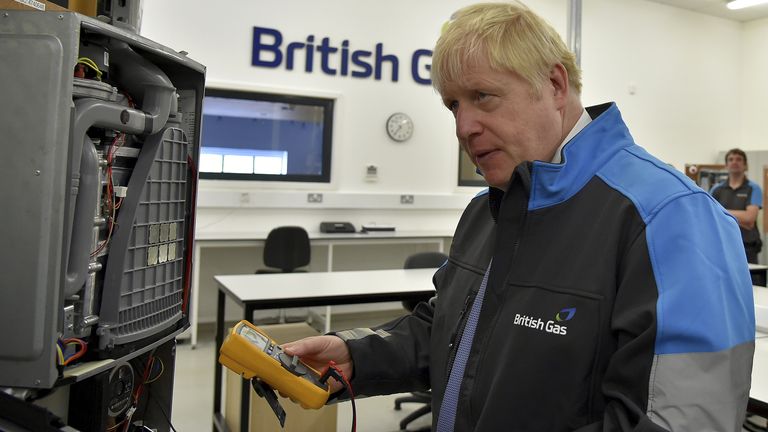Plans to add a green tax levy to energy bills are expected to be confirmed in the next two weeks, according to a report in The Times.
The move to introduce a levy on the fossil fuel, first reported by Sky News, is contained in a new strategy due to be published ahead of next month’s COP26 climate conference in Glasgow.
It commits the government to cutting the price of electricity by removing green levies and slapping additional costs on gas to fund the switch to low-carbon alternatives.
Family struggles with cost of livingHowever, the step is likely to prove controversial, with households already struggling with soaring energy bills in the face of increased wholesale prices, triggered by global demand as economies recover from the coronavirus pandemic.
The energy watchdog Ofgem has already warned millions of households should expect to see a “significant rise” in their bills at the next price cap review.
AdvertisementOne government insider told The Times that the plans were “madness”.
Earlier this week, Boris Johnson said Britain was aiming to produce “clean power” by 2035 as part of the nation’s goal of reaching net zero carbon emissions.
More on Boris Johnson Related Topics: Boris JohnsonCOP26climate changeBusiness Secretary Kwasi Kwarteng has also insisted that by decarbonising the UK’s power supply, the government would ensure households are less exposed to swings in fossil fuel markets.
The government will undertake a series of consultations on the carbon reduction plan, which is likely to start in 2023 and could add £170 a year to gas bills, The Times said.
The strategy will reportedly include measures to boost the sale of heat pumps, which currently cost about £10,000, compared with £2,000 for a gas boiler.
A spokesman for the Department for Business, Energy and Industrial Strategy told the Times: “We’ll set out our upcoming heat and buildings strategy shortly. No decisions have been made.”
Meanwhile, soaring energy costs have prompted industry leaders to warn the government their factories could stop production or permanently close.
:Subscribe to ClimateCast on Spotify, Apple Podcasts, or Spreaker
Mr Kwarteng met representatives of energy intensive industries on Friday to discuss the crisis affecting wholesale gas, which has rocketed in price by 250% since the start of the year.
It follows claims that Russia, which supplies much of Europe, is contributing to the volatility of the market by limiting stocks.
Businessman and Kremlin critic Bill Browder told Sky News: “I think that there are economic factors that have played into the rise of prices of gas and may other commodities, but Vladimir Putin never lets a good crisis go to waste.
“He will surely be involved in trying to exploit this for his own geo-political advantage.”
The Russian leader “would have been smiling ear to ear” after gas prices fell when he offered to help stabilise the market, said Mr Browder.
He added: “He’s up to all sorts of nefarious activities and by having this kind of leverage over us he is hoping people in the corridors of power, here and elsewhere, will say, ‘We can’t say anything to Putin because if we do he is going to cut off the supply of gas’.”
Watch the Daily Climate Show at 6.30pm Monday to Friday on Sky News, the Sky News website and app, on YouTube and Twitter. The show investigates how global warming is changing our landscape and highlights solutions to the crisis.
